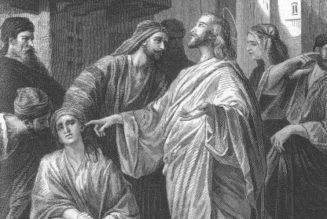By Fr. Jerry Pokorsky ( bio – articles – email ) | Mar 24, 2025
We tend to measure the morality of our behavior against the effects of our actions. The criteria seem reasonable, but some evil actions (such as dishonest stock trading) pay rich rewards. Among the most neglected concepts in Catholic moral theology are intrinsically evil acts that offend God.
An “intrinsically evil act” is evil in itself. Presumed mitigating circumstances and good intentions cannot transform the nature of an intrinsically evil act into a good act. The Church clusters inherently evil acts around the Ten Commandments: blasphemy, murder, adultery, contraception, fornication, theft, lies, and so on. We are quick to notice the intrinsic evil speck in the eye of others but fail to see the intrinsic evil plank in our own eye (to bungle the words of Jesus).
The acclaimed Jewish movie producers, the Coen brothers (Fargo and Brother Where Art Thou), have a surprising track record for Catholic insights. Their Hail Caesar is a brilliant comedy regarding a 1950s movie production about Jesus. Many scenes are hilarious (especially the producer’s focus group of religious leaders). The movie begins with the main character, a movie producer, going to Confession.
The producer confesses he smokes too much and lies to his wife about his smoking. The priest dutifully grants the absolution. The rest of the movie depicts several intrinsically evil acts (such as requiring a leading actress to fake marriage to disguise her illicit pregnancy). But the producer is oblivious to them. In the closing scenes, he again confesses that he smokes too much and lies to his wife about his smoking. A remarkable insight by the Coen brothers! We consistently overlook the evil within our hearts and the need for repentance.
Jesus teaches repentance in the beloved Parable of the Prodigal Son (cf. Lk. 15:11-32). After a dissolute life, the wayward son returns to his father acknowledging that he sinned against heaven and his father and does not deserve to be called his son. The acknowledgment is accurate and self-serving. The son ruined his life and realized life wasn’t better on the other side according to his plans. Did he specifically repent of squandering his inheritance, bunking with prostitutes, and living like a party animal? The parable provides only a few clues. But it’s safe to conclude that the repentance bar is low. The father accepts repentance motivated by self-interest. Self-interest in defense of morality is no vice.
The painful account of King David’s adultery is beloved because of its happy conclusion (cf. 2 Sam. 11ff). As his army goes to war, King David relaxes back at the palace, lazily gazing at the girl bathing next door. He commits adultery and conspires to murder Bathsheba’s husband to cover up his crime. Unlike most court prophets, Nathan isn’t amused. With perfect timing, Nathan describes how a rich man stole a poor man’s beloved pet lamb for a feast. David is outraged and demands justice. But Nathan responds, “Thou art the man!” David takes the punch, repents, and pens Psalm 51, the classic prayer of repentance. Sometimes we need a prophet to break patterns of self-deception.
Imagine an Israelite grandfather surrounded by his grandchildren telling the story of Jonah and the whale (cf. Book of Jonah). God directs Jonah to go to the hated Ninevites and preach repentance. Jonah evades his prophetic duties and boards a ship to Tarshish, making his getaway. A mighty tempest threatens to sink the vessel, and Jonah admits he offended the God of the Hebrews. The seafarers toss him overboard, and a whale swallows him. The critter vomits poor Jonah on the dry land, and Jonah reluctantly continues his prophetic journey to the Ninevites. God directs Jonah to preach repentance and, to his dismay, the hated Ninevites repent and please God. If the enemies of Israel win God’s approval by repentance, why don’t the Hebrews? Good question, kids!
In the Gospel, Jesus explains that the sins of the Galileans murdered by Pilate and the eighteen killed by the collapse of the tower were not worse than the rest of us. But Jesus warns, “But unless you repent you will all likewise perish.” (Lk. 13:9) The Parable of the Barren Fig Tree immediately follows this passage. The parable carries the same message as Jonah. If fertilizing the barren fig tree doesn’t revive it, God will cut it down. The fig tree symbolizes Israel. If God’s chosen people will not repent, His salvation will come to those outside the fold. Ditto Catholics today. Indeed, there are many devout Muslims who, with God’s grace, would make faithful Catholics to replace us. (Are you listening, Western Civilization?)
History is replete with evil cultural patterns, accepted as reasonable at various times: the brutal slave trade by Christians back then and “transgender” genital mutilation today. As we look back over the decades, we may have memories of open sores and healed wounds of sins. The Holy Spirit stirs us to repentance. Sometimes the Devil disturbs a healed conscience to discourage us. A healthy examination of conscience with God’s grace provides a happy resolution. “May God who has enlightened every heart help you to know His sins and trust in His mercy.”
An examination of conscience measures our responsible actions against the Ten Commandments. Feelings are not sins. We have good reason for our anger when a reckless driver cuts us off in traffic. But a road rage response is irrational. We repent of actions—both intrinsically evil acts and those acts rendered evil by circumstances and intention—unjust thoughts, words, and deeds. Where have I failed in justice?
Lent is the liturgical season of repentance. We repent of sins that bring us bitter experiences. We heed the warnings of prophetic voices as we fear God’s wrath after death. We resolve to walk with Jesus like His apostles, learn from Him, and rejoice in His love as a friend. The memory of our transgressions remains, but with repentance, ratified by a good Confession, we can rest in peace.
Sound Off! CatholicCulture.org supporters weigh in.
All comments are moderated. To lighten our editing burden, only current donors are allowed to Sound Off. If you are a current donor, log in to see the comment form; otherwise please support our work, and Sound Off!

There are no comments yet for this item.









